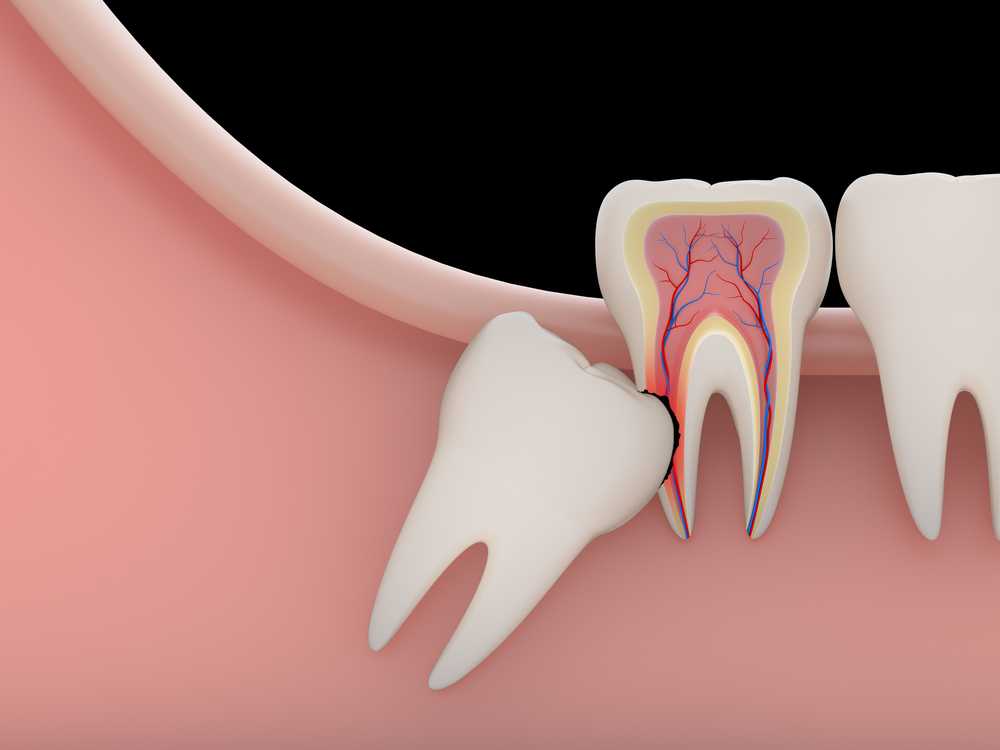If a tooth does not come in, or emerges only partially, it is considered to be impacted. This most commonly happens with the wisdom teeth (the third set of molars). They are the last teeth to erupt. They usually come in between the ages of 17 and 21.
Impacted wisdom teeth are very common. They are often painless and do not cause problems. However, some professionals believe an impacted tooth pushes on the next tooth, which pushes the next tooth. Eventually, this can cause a misaligned bite. A partially emerged tooth can trap food, plaque, and other debris in the soft tissue around it, which can lead to inflammation and tenderness of the gums and unpleasant mouth odor. This is called pericoronitis. The retained debris may also lead to the decay on the wisdom tooth or the neighboring tooth, or even bone loss.
Signs of impacted wisdom teeth
There may be no symptoms of a fully impacted tooth. Symptoms of a partially impacted tooth may include:
- Bad breath
- Difficulty opening the mouth (occasionally)
- Pain or tenderness of the gums or jaw bone
- Prolonged headache or jaw ache
- Redness and swelling of the gums around the impacted tooth
- Swollen lymph nodes of the neck (occasionally)
- Unpleasant taste when biting down on or near the area
- Visible gap where a tooth did not emerge
Treatment methods for impacted wisdom teeth
If you suspect you have an impacted wisdom tooth, see your dentist as soon as possible. They can examine your teeth and take an X-ray of your mouth to determine if an impacted tooth is causing your symptoms. If it is, they can discuss the benefits and risks of treatment.
Treatment options may include:
Waiting and monitoring
If your impacted tooth isn’t causing any symptoms, your dentist may suggest a wait-and-see approach. With this approach, instead of surgically removing the tooth, your dentist will regularly monitor it so that they can see if any problems develop.
This will be easy to do if you go in for regular dental checkups.
Surgery
If you’re experiencing pain and other unpleasant side effects from an impacted tooth, your dentist may recommend extraction surgery, particularly in the case of impacted wisdom teeth. They may also recommend extraction if the impacted tooth will have a negative effect on other teeth.
Tooth extraction surgery is usually done as an outpatient procedure at an oral surgeon’s office, meaning you can go home the same day you have the procedure. The procedure usually takes 45 to 60 minutes, and you’ll likely be put under local anesthesia. Recovery may take 7 to 10 days, but you should be able to return to work or school within a few days of having the procedure.
Eruption aids
When the canine teeth are impacted, eruption aids may be used to get the tooth to erupt properly. Eruption aids may include braces, brackets, or by extracting baby or adult teeth that may be blocking the canines. These methods are most effective when performed on younger people.
If eruption can’t be achieved, then the impacted tooth will need to be removed and replaced with a dental implant or bridge.
How is the process of wisdom tooth surgery?
Wisdom tooth extraction is a dental surgery procedure that involves cutting through the gum tissue covering the tooth, removing the connective tissue between the wisdom tooth and the bone, removing the wisdom tooth, and sewing the gum closed again. Occasionally, the bone around an impacted tooth must be removed in order to perform the extraction. In some instances, the wisdom tooth may need t
ions to be removed.
You should not experience any pain during the surgery, because you will be under local or general anesthesia. However, after surgery, many people do experience pain. The amount of discomfort depends on whether you give you pain medication and the your tolerance for discomfort. Generally, most people experience some level of discomfort for three days after the procedure.
How to prepare for wisdom tooth surgery?
Once your dentist has determined your wisdom teeth are impacted, you will first have an appointment with an oral surgeon. During this visit, they will explain the process and also allow you to ask any questions regarding the procedure or the recovery process. They will then go over your personal health history and inquire about any medications that you are taking.
For your preparation, you will need to arrange for care for children or pets during your procedure, secure a ride to and from the appointment, and take a few days off work or school for the procedure and recovery.
What is the care after wisdom tooth surgery?
Right after surgery, you are likely to feel groggy and will experience some mild pain and swelling. Your surgeon will recommend medication to control the pain by either writing you a prescription or discussing over-the-counter medication to take. Driving will be restricted for 12 to 24 hours, so you will need to have a ride home and someone with you who can help you understand post-op instructions. The rest of the day, you should take it easy and rest when possible.
You will be able to eat immediately after your procedure but may not have much of an appetite as the anesthetic fully wears off. Stick to soft foods at first until most of the swelling goes down. Also, avoid hot foods as the gums where the teeth were removed will be sensitive. Avoid nuts, seeds, hard foods, and straws during the healing process to avoid damaging your stitches.
Follow all post-operative instructions on hygiene closely to avoid infection. You will need to avoid brushing your teeth, rinsing your mouth and flossing for the first 24 hours. Saltwater rinses are advised to aid healing and help with pain and can be started right away. Just be sure not to spit the solutions out as the suction can interfere with healing. Simply allow the solution to drip out of your mouth. Change the gauze as needed until there is no more bleeding.
You should be mostly recovered in three to four days and can resume normal activities, though it can take up to a month for the site to fully heal, so you should still avoid sucking through straws, smoking, and heavy exercise for about a month.


